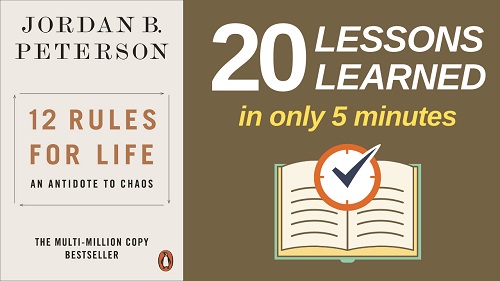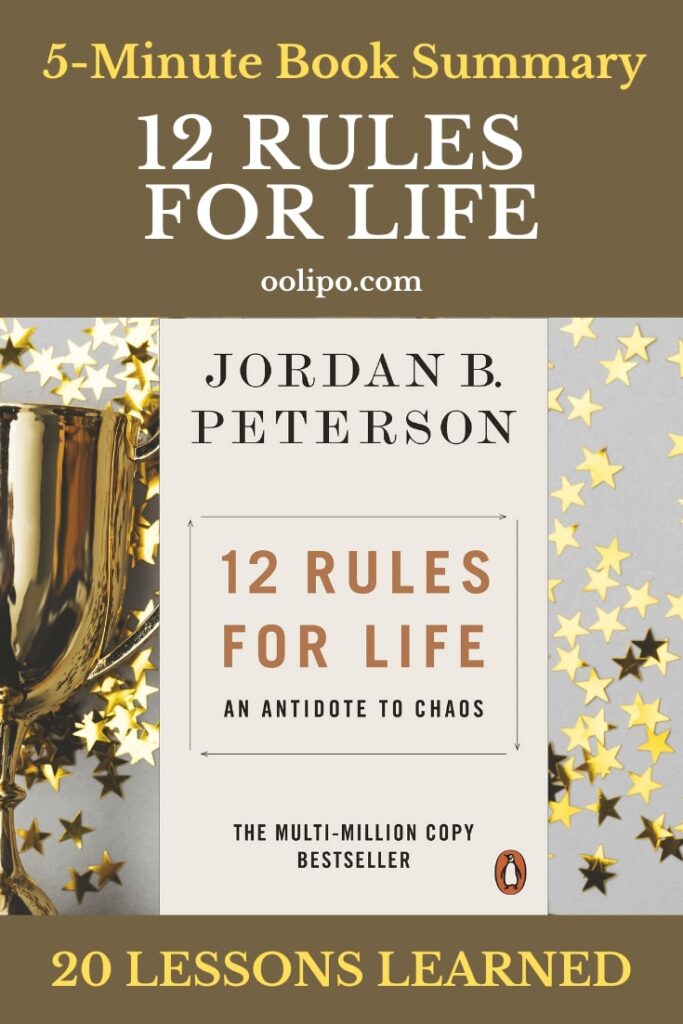Published in 2018 and with over 155,000 ratings on Goodreads and Amazon combined, 12 Rules for Life: An Antidote to Chaos has received both critical acclaim and criticism. You will find 12 Rules for Life summary, top 10 quotes, and PDF download link in this post.

With a mixture of philosophy, scripture, and personal anecdotes, Canadian psychologist, Jordan B. Peterson, presents the twelve rules that he believes will draw a clear divide between order and chaos. The balance is essential as it is where one ultimately finds meaning in life and all the troubles that come along with it.
12 Rules for Life Summary
Here are the 20 lessons to take from Peterson’s self-help novel, beginning with the twelve rules for life:
#1 The way you carry yourself will transform you
The way you carry yourself will eventually change your perception of yourself and the way others perceive you. So, although Peterson believes that literally having good posture will aid this concept, this rule encourages you to seek after what you desire. Eventually, you will begin to shift into those qualities and abilities.
#2 Treat yourself like you would treat a friend
Peterson suggests that you should care for yourself as you would for another person. He applies the example of children, and the idea of giving them candy to make them happy. Just because candy makes them happy does not mean that you will only feed them candy. In a similar approach, you want to figure out what you are good for, not what you want or what makes you happy. The focus should be on what is good for you. Happy does not always equate to good. Peterson encourages the practice of envisioning what your life would look like if it was taken care of properly.
#3 Surround yourself with good people, who want the best for you
Peterson declares that this rule is to make your life harder, not easier. People that want the best for you can demand the best of you–encouraging you to work harder. Befriending this type of people, or generally, just good people, challenges you to become a better version of yourself, as they will most likely not tolerate destructive behavior. A good person is an ideal that you should utilize to rectify who you are.
#4 Do not compare yourself to others, use yourself as the target
This one is simple. Don’t compare yourself to others. The more you compare yourself to someone more successful than you, the more envious you can become. It is important to admit that there will always be someone slightly better at your skill than you are. Comparing yourself to others does no good. Your only competition should be yourself from the previous day. The solutions to your problems are tailored to you, so your focus should be only on yourself.
#5 Do not let your children become someone you dislike
This rule is centered around the idea that parents are responsible for the way children learn how to interact with society. Peterson argues that if you start to dislike your children–the people that you are meant to love unconditionally–then they will most likely be disliked by others. By preventing qualities or actions that would make you dislike them, you avoid the social world from shutting them out.
#6 Resolve your issues at home before you try to help the world
Focusing on the idea of binding your ambition with humility–this rule suggests that if everyone took care of their issues first, like their house, before tackling the world, the world might be easier to rid of evil. This rule is focused on the idea that you should focus on what is in front of you, immediate issues, rather than something that is out of your hands and in the future.
#7 Pursue long term benefits over short terms benefits
The lesson here is to focus on what is meaningful. “Meaning” is more abundant compared to “expedient” which is limiting and fleeting. Although sacrifices will be a consequence of pursuing what is meaningful, those sacrifices will benefit you in the long run–think of delayed gratification. This rule seems to be the spirit of Peterson’s self-help book.
#8 If you cannot tell the truth at least try not to lie
As simple as this seems, Peterson argues that lying, even about small things, should be avoided. Essentially, big lies are composed of smaller lies. As it stands, to avoid lying is not just to spare other people but also to spare yourself. The more you lie, Peterson claims, the less credible you become to yourself, and eventually, you won’t be able to rely on yourself.
#9 Always assume you know less
This is all about active listening. Peterson argues that you will only get bored during a conversation when you are not actively listening, so it is imperative to practice the technique. You’re always going to be surrounded by things you don’t know, so it is best to acknowledge your ignorance.
#10 Speak with clarification and direction
This is centered around manifestation. If you specify the nature and qualities of the being that you want to bring into existence, then you increase the chance of actually becoming that being. Being precise, specifically, moves you in a specific direction, so once you determine the details of your goals it will be easier to achieve them.
#11 Do not stop children from skateboarding
At first glance, this rule might be considered random to be included with rules for life, but it is based on the idea that you want to encourage children, but not shelter them. Peterson argues that when they are doing a dangerous activity like skateboarding you are allowing children to participate in similar motions of life. Life, like skateboarding, can be risky but it will teach them lessons. Allowing children to make their own decisions allows them to grow and develop for a society that also is risky and dangerous.
#12 Find the good in the bad
The last rule that Peterson presents is to encourage the idea that even on a bad day, you can still be fortunate enough to experience good things, however small they may be. In this case, he mentions a small good thing is petting a random cat on the street.
#13 Order, although good, can also be excessive
Peterson’s self-help book is centered around finding a solution to chaos, so that would mean that order is what you should strive for. Too much order however is no better than chaos. Order, as defined by Peterson, is the space in which social norms operate, and where people remain predictable and cooperative.
#14 Without chaos, you cannot have order
Chaos is what the rules are for. It is the source of new things and the destination of the dead, according to Peterson. It is a space where or when the unexpected happens.
#15 To make any change, it has to start with you
Similar to rule six of the twelve rules for life, this centers around the idea that if everyone betters themselves individually then collectively society will also improve. No universal change can occur if the individuals have not improved.
#16 The soul hungers for heroism
Peterson claims that the soul of the individual will always seek heroism and the one who acknowledges the responsibility of that hunger will lead a meaningful life.
#17 Parents have authority over society
This is an essential lesson that is not officially a part of the twelve rules for life. Parents teach their children how to behave and this allows for other people, society, to interact with them. Parents should not be worried about not being liked or loved by their children if they were to discipline them, their role is essential.
#18 To share means to initiate the process of trade
Sharing should not be seen as losing something but rather a process of trade. It is a social interaction that allows a personality that is reliable and honest to grow. Peterson presents the example of having friends as a form of trade. You ask them for a favor, nothing too grand, and a cycle of being indebted to each other occurs. This allows for trust and honesty to grow mutually.
#19 Never sacrifice what you could be for what you are
Peterson presents the idea that you are what you know, but that you are also all that you could know. An individual should not limit themselves to who they currently are, but they should look towards what they are capable of. This means challenging the act of seeing. Seeing reveals what we know and rely on but you should not limit yourself to only what you can see.
#20 Knowledge of reality enables mastery of reality
Mastering reality is all about specificity. This idea encourages the individual to specify their problems, as it allows you to know what you want. Acknowledging reality implies admitting the problems exist.
Top 10 Quotes from 12 Rules for Life
- When you have something to say, silence is a lie
- What you aim at determines what you see
- Sometimes it seems the only people willing to give advice in a relativistic society are those with the least to offer
- It took untold generations to get you where you are. A little gratitude might be in order. If you’re going to insist on bending the world to your way, you better have your reasons
- Compare yourself to who you were yesterday, not to who someone else is today
- Always place your becoming above your current being
- The successful among us delay gratification. The successful among us bargain with the future
- It is my firm belief that the best way to fix the world is to fix yourself
- Stop saying those things that make you weak and ashamed. Say only those things that make you strong. Do only those things that you could speak of with honor
- We require routine and tradition. That’s order. Order can become excessive, and that’s not good, but chaos can swamp us, so we drown— and that is also not good. We need to stay on the straight and narrow path
Free PDF Download of 12 Rules for Life Summary to Save or Print
We created a PDF file with the 12 Rules for Life summary and quotes on this page for easy access: Download 12 Rules for Life PDF Summary. If you want to buy the paperback version of the book, check out this page.
Jordan Peterson’s 10 Rules for Success
Jordan Peterson Explains the 12 Rules for Life
Please share these important lessons by pinning this post to Pinterest.
